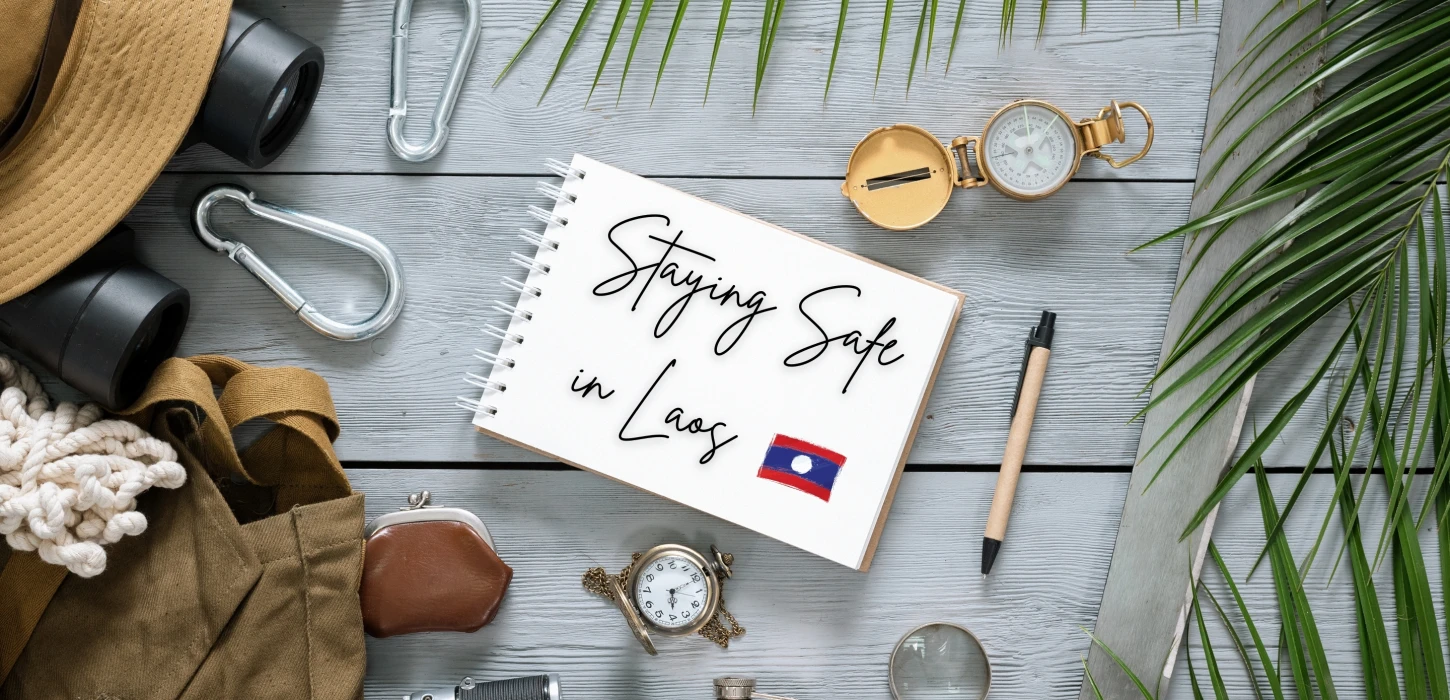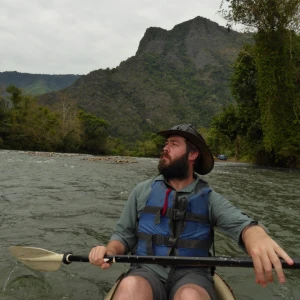Laos is a beautiful country full of unique opportunities for adventure and exploration. But just like any adventure worth having there is always the chance that something can go wrong. Follow our simple safety guide and you’ll be sure to get the most out of your trip!
Food and drinks
Laos has an incredible culinary traditions with bold flavours and strong spices. Lao food is generally quite safe however there are a few dishes that can pose some minor health problems.
Avoid eating raw meat or fish, as it can harbour dangerous bacteria that can ruin your holiday. Raw fruit and vegetables are fine but it is a good idea to wash them first to avoid consuming pesticides. Lao’s national flavouring sauce is padek, a fermented fish sauce. Despite its powerful aroma it is perfectly fine to eat, even if many travellers find its flavour overpowering.
Lao water is generally fine when entering the system but the aging pipe network means that its safety cannot be guaranteed by the time it comes out of your tap. Luckily bottled water is widely available to be purchased. For the ecologically minded there are bottle refill stations around many major cities as well as being available in many hotels and guesthouses. A refillable bottle is not only great for the planet, but great for your wallet as well.
There are unfounded rumours that ice is not safe for consumption in South East Asia. This is generally untrue and completely untrue in Laos. Ice comes from large factories utilising evaporative and UV treatment to sterilise the water before freezing it, making it some of the cleanest water you can get.
Health and Wellbeing
If you do become ill during your trip there are doctors and hospitals in all major cities. Not all of these doctors will speak English, especially in more rural areas. In Vientiane you can visit the French Clinic (https://goo.gl/maps/zBHjiifjib1bdmxx7) staffed by French doctors, which is generally the choice for expats living in Vientiane.
For major incidents requiring hospitalisation there are hospitals in every major city. Be aware that these are often well below western standards. For any serious injury or surgery you may want to consider a medivac to Thailand or Vietnam. This is best organised through your travel insurance.
The most common illness for visitors to Lao is Traveller’s Diarrhea which can be caused by a number of issues, most commonly the introduction of new gut bacteria. This generally resolves itself within two days as your intestinal biome adjusts itself to the new bacteria. During this time it is important to stay hydrated by drinking lots of water, as well as eating simple foods that are easy to digest such as rice, bananas, and plain toast. If symptoms get worse, you may want to consider a trip to a doctor.
Many medications are available over the counter at pharmacies in Laos. Never take anything that you are unsure about, or would normally require a prescription, without consulting a medical professional.
Tropical Diseases
Being a tropical country, there are many mosquitos in Laos. Malaria is mostly eradicated from Laos and only exists in a few small pockets in the southern and central areas. However dengue fever is prevalent around the country, especially during the rainy season of April to October. It is important to take steps to reduce your exposure and reduce your chance of catching this disease. Wear long sleeved clothing, especially around sunrise, sunset and dusk when mosquitos are most active. Wear insect repellent and reapply regularly. Use mosquito nets if they are available.
Some tick-borne diseases are also prevalent so if you are spending any time in the jungle make sure to check yourself for ticks at the end of each day. Remove ticks with tweezers by grabbing the head and pulling firmly. There are often leeches in the jungle, and while they are inconvenient they do not carry diseases.
Of course the best way to avoid getting sick is to prevent it from happening. Before coming to Laos you should ensure that your vaccinations are up to date, especially:
Typhoid
Rabies
Hepatitis A
Transport
Travelling around Laos can be an adventure in itself. Minivans and buses are generally quite safe, with accidents involving these vehicles being extremely rare. If one is available always, make sure to use a seatbelt.
The largest number of accidents usually involve motorbikes and drinking driving. Never ride a motorbike while intoxicated. Avoid riding motorbikes after dark as drink driving is a significant problem in Laos.
If you choose to ride a motorbike make sure that you are licenced to do so in Laos, your travel insurance will cover you in case of an accident, and that you always wear a helmet and ideally gloves as well. Be extremely careful riding in cities and be aware that not all Lao drivers will follow the Lao rules. Drive defensively and always assume that other vehicles are not aware of you. Watch out for the ‘South East Asian Tattoo’, a burn on your inner calf from your exhaust pipe. Be careful when getting on and off your bike and avoid the exhaust pipe wherever possible.
If you are undertaking a long ride between towns it is always a good idea to do a pre-ride trip, including checking tire pressure, fuel level, and oil level. The rumour that oil should be changed every 500 kilometres on a Honda Win is greatly exaggerated but regular maintenance should still be done. Mechanics are widely available throughout Laos and are generally cheap and competent.
Crime
Crimes against tourists are extremely rare and Laos has a very low crime rate thanks to its strong community spirit. Very occasionally there are reports of opportunistic crime and petty theft, but you can reduce the chances of this happening by following some simple steps.
Never leave your valuables unattended or on open display. Sling handbags and over your body, not just your shoulder, to reduce temptation for bag snatchers. Avoid walking alone late at night, especially in poorly lit areas. Do not flaunt your wealth.
Alcohol and drugs
Lao people love a drink and Beer Lao is as common as it is delicious. Local rice whiskey, Lao Lao, is also widely available but dangerously strong. Locally produced rice wine, Lao Hai, is also quite common but not as widely available as Beer Lao or Lao Lao. It is much less potent and more enjoyable than Lao Lao, but it is difficult to judge its alcohol content, so drink it in moderation.
Alcohol is quite cheap in Laos and there is a temptation to over-indulge. Know your limits and drink in moderation. If you are drinking with friends, make sure you look after each other. Never mix alcohol with swimming.
Drugs are illegal in Laos and the possession or use of drugs can carry harsh penalties. The once infamous party town of Vang Vieng has significantly cracked down on the use of drugs and there are many undercover police patrolling the town to enforce anti-drug policies. The risk of prison, huge fines, over dose or drug induced psychosis are far too high to make it worth the risk.
UXOs
Laos became the most heavily bombed country in the world during the ‘Secret War’, when American bombers dropped millions of tons of ordinance over the country in a failed effort to defeat the communist revolutionaries in Laos and Vietnam. A large majority of these bombs were cluster bombs containing hundreds of little ‘bombies’, which had a 30% failure rate. This caused large swathes of the country to be covered in unexploded bombs, a deadly legacy still having an impact almost 50 years after the war ended. While large areas of the country have been cleared by NGOs working in UXO clearance, everyday more bombs are uncovered.
This poses a small, but significant, threat for tourists as most urban areas and villages are quite safe. However if you trekking in the jungle, especially near the Vietnamese border, it is a threat that needs to be considered. Always use well established tracks, avoid stepping off the trail, and never pick up unknown items off the jungle floor. Never buy war remnants as this encourages locals, especially children, to look for them.
Be prepared
Any time you are travelling you should take out travel insurance. Make sure you read your insurance policy and understand what will and won’t be covered. Make sure you know who to call in an emergency, and let friends and family know when and where you will be travelling. Expect health services to be quite limited in rural areas and emergency response to be almost non existent. Be prepared to look after yourself with a small first aid kit including some basic medications for gastro-intestinal issues.
Adventure Tours
High adrenaline tours such as zip lining, white water kayaking, or ATVs are very popular in Laos. If you would like to do one of these great activities make sure you pick a reliable company. Ask what safety equipment is provided, and what first aid training is given to the staff. Make sure that your chosen activity is covered by your travel insurance. When you are on the tour make sure to listen to the instructions from staff, and don’t be afraid to ask questions if you don’t understand.
In general Laos is a very safe country for tourists. Most people have a great time and never have any problems. If you follow some basic precautions we know that you will also have a great, hassle free, time. So be safe and Discover Laos Today!


